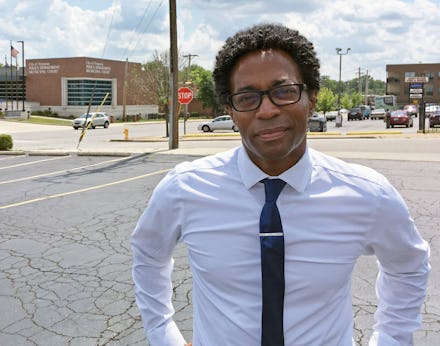4 years after Michael Brown’s death, the implications of Bob McCulloch’s ouster spark debate

Four years ago Thursday, officer Darren Wilson shot and killed unarmed 18-year-old Michael Brown in Ferguson, Missouri, sparking months of protests, intermittent rioting and a heated discussion about racial tensions in the St. Louis suburb and beyond.
A major part of the fallout was how St. Louis County prosecuting attorney Robert McCulloch handled the proceedings. McCulloch’s actions were unusual. He presented thousands of pages of evidence and testimony to a grand jury and put the power to indict Wilson in their hands. The jury declined to do so, and though McCulloch released their findings to the public, his unwillingness to charge Wilson on his own and the special treatment he gave the officer’s case broadcast to many that justice for the slain teen was not his priority.
This week, McCulloch’s tenure came to an end. The 67-year-old prosecutor was ousted from his 27-year post by Ferguson city councilman Wesley Bell in a Democratic primary election Tuesday — two days before the anniversary of Brown’s death.
It was a victory for McCulloch’s detractors, and for local advocates, a bellwether of progressive change.
“[The ouster] reflects the fact that there is a real coalition of progressive change-oriented people and thinking in this region that is ascending,” Blake Strode, executive director of ArchCity Defenders, a St. Louis-based nonprofit civil rights law firm, said in a phone interview Thursday. “And that coalition is oriented for justice and equity. I think Wesley Bell really benefited from that and his campaign wisely spoke to that.”
There is no Republican opponent for Bell in the November general election, so he is considered the presumptive county prosecuting attorney-elect. His victory was also historic, as he will be the first African-American ever to hold the post.
“Our message was about addressing inequities throughout St. Louis County to make sure everyone is treated fairly, and that message resonated with people,” the former public defender, municipal judge and prosecutor said, according to the St. Louis Post-Dispatch.
“[McCulloch] was not one that stood for a great deal of change and reform in the prosecutor’s office in terms of criminal justice and mass incarceration,” added Strode. “He really did represent the status quo, and represented the systems and policies that created the kind of inequity and racial inequity that we see in the criminal justice system.”
With Bell likely taking office in January, voters, activists and civil rights attorneys will be watching to see if he delivers on his promises to reform criminal justice policies in St. Louis. This includes cutting down on nonviolent marijuana possession charges, according to KMOV. According to the Riverfront Times, 85% of people arrested by the St. Louis Metropolitan Police Department for marijuana possession between 2014 and October 2017 were black.
The ArchCity Defenders also await how Bell will approach St. Louis County’s “wanteds” policy, according to Strode — referring to a practice by which St. Louis County police officers enter the names of people they want to question into a database, allowing other officers to arrest and interrogate them without requiring a warrant from a judge.
“We believe ‘wanteds’ is ... blatantly unconstitutional,” Strode said. “But it’s also been a willingness by the prosecuting attorney’s office to prosecute cases that stem from ‘wanteds’ arrests and what we would love to see from Wesley Bell when he takes office, is to decline any case that is stemming from the basis of ‘wanteds.’”
Cash bail is another issue Strode would like to see Bell address. McCulloch has claimed his office has not served cash bail for misdemeanors in decades, but data collected by the ACLU of Missouri shows the opposite, the St. Louis American reported. Between 2012 and 2017, 2,775 people were given an average of $445 cash bail for misdemeanors. Strode hopes to see Bell move away from cash bail and incarceration toward a “release upon a promise to return to court” policy.
Michael Brown Sr. even hinted that he may urge Bell to revisit his son’s case.
“People know that what happened wasn’t right, and this does give another chance at going back to court,” Brown Sr. told Riverfront Times. “We will see.”
Strode said the spirit of activism that resulted in the Ferguson uprisings after Brown’s death is still alive and driving the change in St. Louis, and that Bell and other elected officials should honor that while in office.
“I now see the Wesley Bell election as being part of a broad wave that is spearheaded and driven by insightful courageous, brave, young people, primarily people of color here in this region, that’s dragged the region kicking and screaming toward a vision of justice,” Strode said. “I think it behooves all of the elected officials who have been elevated by that energy to be faithful to it, and to act in a way that honors that vision.”